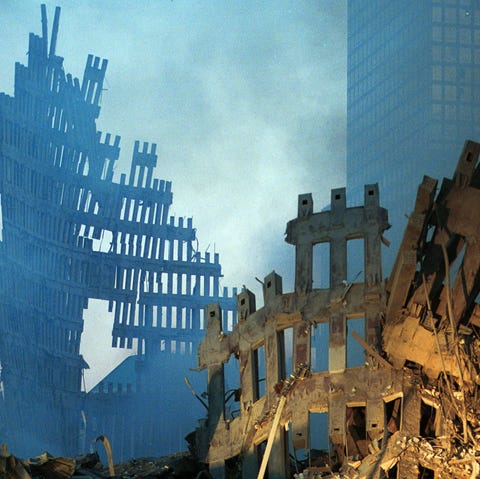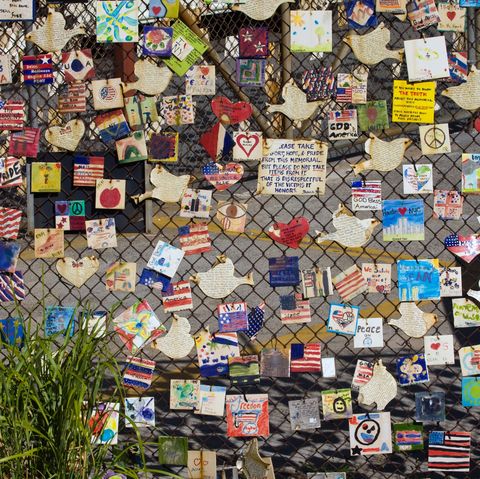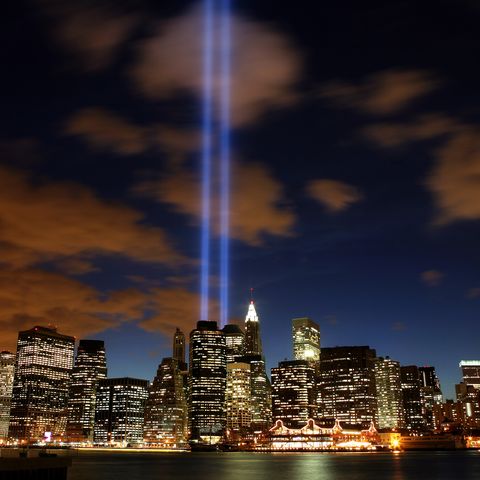It wasn’t too long after the terrorist attacks of 9-11 that life in America changed irrevocably. It didn’t happen all at once, but the change could be felt in ways both subtle and jarring, as novelist and poet Chitra Divakaruni discovered one day at the grocery store with her two sons. In this poignant, heart-wrenching essay, she describes how the “otherness” that made her so attractive to many of her American friends also made her a target of xenophobia and racial abuse. From the January 2002 issue of Good Housekeeping, here is a story that still resonates today.— Alex Belth, Hearst archivist
I confess: Vanity is one of my vices. Perhaps that’s one reason I so enjoy living in the San Francisco area, where people are always walking up and telling me all the things they love about me.
“I love your outfit,” says Elena, who works at the college where I reach. “It’s so elegant! Is there a place where I can get one?”
I smooth down my salwar kameez with a not-so-modest grin and give her the name of a boutique in town.
“I love Indian food!” gushes a stranger on the train to Berkeley. “You’re so lucky to be eating it all the time.”
I briefly consider letting her know that I prefer Mexican or Chinese cuisine when I eat out. That in my home, where I live under the tyranny of my 7- and 10-year-old sons, pizza and French toast are far more common than raita and curry. But already she’s asking if I know a good recipe for tandoori chicken. I dictate one of my mother’s, which she takes down in her Palm Pilot, unaware that I’m drawing liberally upon my imagination to supply the spices I’ve forgotten.
“I love your skin!” my friend Robin exclaims as we job together. “Asian skin ages so well. Mine is just a mess.”
I prescribe a regimen of turmeric paste mask once a week. Less sun. And a virtuous life. “Then perhaps you’ll be reborn as an Indian.”
“Yeah, right,” she says, giving me a push, and we laugh as we cross Van Ness Avenue.
But since the horrifying terrorist attacks, things have been different. People still look at me— but they aren’t always admiring. I’ve seen people whispering to each other as they eye my salwar kameez, and I know that to some of them the loose pants and long tunic seem just like the clothes of the Palestinian women we all saw on TV rejoicing after the attacks. Well-meaning friends have e-mailed warnings that I should wear only Western attire, not go anywhere alone and even buy a gun. I want to laugh off these suggestions, but I can’t. Since the attacks, too many people have faced verbal abuse, been ordered off planes, been beaten — or even been shot to death.
I’ve also been advised to display the American flag prominently on my house and car. This upsets me in a strange way. I love the flag, just as I love America and its commitment to liberty, equality and justice. But it bothers me that my patriotism is suspect unless I put up a flag to demonstrate it. And why? Because I don’t fit the public’s notion of what a “good American” looks like.
The other day, as I was walking into the local grocery with my sons, a man shouted, “F–king Ay-rabs, why don’t you go home!”
I hurried my children into the store, my face burning.
“Mommy,” asked my younger son, “why was that man so angry? Was he talking to us?”
“What did he mean, ‘go home’?” asked my older one. “We’re from right here.”
I had no words with which to answer them.
“Don’t we all want the chance to be happy in the place we’ve chosen to call home?”
It is said that nothing is real until it happens to you. I’d read about the hate crimes that swept the country in the aftermath of September 11. I’d been upset and enraged — but when I saw this man, his face filled with hate for me and my children, something broke in me. My heart beating hard with fear, I became aware, as never before, that some people see a whole different side of otherness. The side that makes them say, “You aren’t one of us. You don’t belong here and you never will.” The side that makes them say, “Go home.”
Whether we like it or not, we now live in a fractured, global world in which the notion of home itself has become a complicated one. We move, living in new places but staying connected to old ones where our parents and friends still live. In many circles, half the people we meet in the course of a day are nothing like us. Some of us embrace this difference with glad fascination; some push it away with angry insecurity. But in both cases, aren’t we focusing on the wrong thing?
This is what I want to say to those who love my foreign looks and culture — and also to those who despise them. Be aware of my otherness, but don’t give it so much importance that you lose sight of what lies beneath. Don’t we all want the chance to be happy in the place we’ve chosen to call home? Aren’t we afraid of the same things — hatred and violence, a war that might turn our fragile world into a wasteland?
In our hopes and fears, you and I are one.
This content is imported from OpenWeb. You may be able to find the same content in another format, or you may be able to find more information, at their web site.




